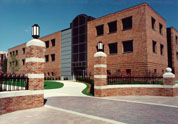 I am in the programming languages research group at the
University of Illinois.
One common philosophy underlying most of my research is
that statically-typed languages are good. Not only does
it eliminate possibly expensive run-time typechecking, type
declarations also make programs much clearer to read.
The tradeoff is that compile-time typechecking is usually
too conservative, and some legal programs would be deemed
incorrect. Hence, languages like C++ and Java provide
facilities for run-time type information and dynamic typechecking.
I am in the programming languages research group at the
University of Illinois.
One common philosophy underlying most of my research is
that statically-typed languages are good. Not only does
it eliminate possibly expensive run-time typechecking, type
declarations also make programs much clearer to read.
The tradeoff is that compile-time typechecking is usually
too conservative, and some legal programs would be deemed
incorrect. Hence, languages like C++ and Java provide
facilities for run-time type information and dynamic typechecking.
Syntactic Control of Interference
One of my research projects involves SCI, or
Syntactic Control of Interference,
which was invented by John Reynolds way back in 1978. SCI is a method for
controlling interference, or making sure that different parts of a
program don't try to read and write the same memory locations in a way that
would cause confusion and chaos. Ensuring noninterference makes it much easier
to prove properties about programs. In particular, it has significant
implications for concurrent programming.
SCI controls interference based on the program's syntax, so it is possible to
devise a set of typing rules to determine when interference may occur. Two
type systems for SCI are SCI2, due to Reynolds
himself, and SCIR, which was designed by
O'Hearn et al. The
latter type system is the simpler of the two, but at the time of its
invention, it wasn't clear if type inference or even typechecking was
feasible. My advisor, Uday Reddy, and I co-wrote a paper entitled
Type Reconstruction for SCI which shows that type
inference (and hence typechecking) is in fact decidable for SCIR.
In more recent work, we integrated some ideas of Professor Reddy and Hongseok
Yang to produce a "better" type inference algorithm, which is documented in
Type Reconstruction for SCI, Part 2.
This time, some extraneous operators
are removed from the language, and we also consider adding let-based
polymorphism as in ML.
Object-Oriented Type Systems
Another project involves finding more expressive type systems for
object-oriented languages. We would like a language that is "dynamic" like
Smalltalk, but still statically-typed like C++ and Java. An ideal type system
might have the following features:
- Classes and interfaces should be distinct. The type of an object should
be an interface, which only includes information about what
methods the object can respond to, and not information about the
actual implementation of the object, which is contained in a class.
Using classes as types forces recompilation of client code every time a
class changes, even if the clients themselves do not change.
Although Smalltalk is a dynamically-typed language, its concept of typing
follows the above approach: two objects which have the same "interface"
may be substituted for one another. Java includes both interfaces and
classes, but they are both considered types. There are proposals for
adding
signatures
to C++, which would give C++ some of the flavor of Java. In addition, C++
and Java both support pure abstract classes, which are very similar to
interfaces.
- Subtyping should be structural, instead of declared. In other
words, the programmer should not need to explicitly declare that one
interface is a subtype of another, as in Java or C++.
- Separately-compilable parameterized methods, interfaces and classes
should be supported. This is particularly important for defining and
manipulating container objects, such as linked lists and trees. C++
template compilation requires code substitution, which precludes separate
compilation and usually results in overly large object files. Java does
not support any notion of parameterization, although proposals for such
an extension have been made in projects such as
Pizza and
PolyJ.
- Binary methods
are methods in some class C which expect a parameter of "type"
C. Comparison methods, for example, are often implemented as
binary methods. Most languages require the use of run-time type
information to support such methods, but it is possible to add either
F-bounded polymorphism or
matching to the type system instead.
 I am in the programming languages research group at the
University of Illinois.
One common philosophy underlying most of my research is
that statically-typed languages are good. Not only does
it eliminate possibly expensive run-time typechecking, type
declarations also make programs much clearer to read.
The tradeoff is that compile-time typechecking is usually
too conservative, and some legal programs would be deemed
incorrect. Hence, languages like C++ and Java provide
facilities for run-time type information and dynamic typechecking.
I am in the programming languages research group at the
University of Illinois.
One common philosophy underlying most of my research is
that statically-typed languages are good. Not only does
it eliminate possibly expensive run-time typechecking, type
declarations also make programs much clearer to read.
The tradeoff is that compile-time typechecking is usually
too conservative, and some legal programs would be deemed
incorrect. Hence, languages like C++ and Java provide
facilities for run-time type information and dynamic typechecking.